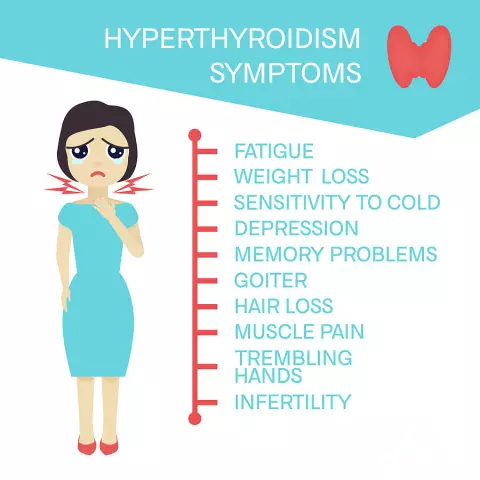- Author Rachel Wainwright wainwright@abchealthonline.com.
- Public 2023-12-15 07:39.
- Last modified 2025-11-02 20:14.
Thyrotoxicosis

Thyrotoxicosis is a pathological condition caused by an increased level of hormones (triiodothyronine, thyroxine) of the thyroid gland, which provoke intoxication of the body. The term hyperthyroidism is also used to refer to this condition.
Thyrotoxicosis: general information about the disease
With hyperfunction of the thyroid gland, thyroid hormones in excess enter the blood and tissues of the body, which leads to the separation of tissue and oxidative phosphorylation. Thyrotoxicosis inevitably leads to disruption of energy metabolism in the body. As a result, excess heat generation occurs in the body, and the amount of energy accumulated by ATP decreases. Energy replenishment occurs by accelerating all metabolic processes in the body.
An excess of thyroid hormones in the body leads to the disruption of many processes, affecting the state of the nervous system, heart function, visual function, functions of the musculoskeletal system, gastrointestinal tract, and reproductive system. It is believed that dysfunction of the thyroid gland does not lead to serious consequences with adequate drug correction of the condition. In the absence of proper treatment for thyrotoxicosis, the following complications may develop:
- Infiltrative ophthalmopathy;
- Heart failure;
- Various forms of arrhythmias;
- Thyrotoxic crisis is a serious condition in which an avalanche-like increase in manifestations is observed, due to sharp increases in the concentration of thyroid hormones in the blood.
Depending on the level of occurrence and development of the disorder, the following types of thyrotoxicosis are distinguished:
- Primary - the disorder develops in the thyroid gland;
- Secondary - the disorder develops in the pituitary gland;
- Tertiary - a violation occurs in the hypothalamus.
The main risk factors for the development of thyrotoxicosis in the body:
- Complicated family history;
- Gender;
- Chronic deficiency of iodine intake with food;
- Autoimmune diseases;
- Chronic forms of stress.
The course of thyrotoxicosis is characterized by sex and age factors. In men with thyrotoxicosis, the development of infiltrative ophthalmopathy is more often observed, in old age, thyrotoxicosis is often accompanied by a violation of the heart rhythm, characteristic changes in the psyche. In childhood, hyperthyroidism is characterized by neurotic manifestations.
Thyrotoxicosis: causes of the development of the disease
With thyrotoxicosis, the reasons for the development of thyroid dysfunction may be:
- Toxic diffuse goiter, also Graves' disease - an autoimmune disease that is the most common cause of thyrotoxicosis;
- Toxic nodular goiter or toxic adenoma of the thyroid gland (Plummer's disease) is a benign neoplasm that autonomously produces thyroid hormones;
- Subacute thyroiditis - diffuse or focal inflammation of the thyroid gland;
- Uncontrolled intake of drugs containing thyroid hormones;
- Excessive content or consumption of iodine by the body;
- Ovarian teratomas are a special type of tumor neoplasms formed by gonocytes;
- Tumors of the pituitary gland with increased secretion of thyroid-stimulating hormone.
With thyrotoxicosis, the causes of the development of the disorder are extremely important, since the treatment of the condition should be aimed not only at normalizing the level of hormones in the body, but also at eliminating the cause of the thyroid gland producing hormones in excess. To establish the reasons for the development of hyperthyroidism, the patient needs a comprehensive examination. With thyrotoxicosis, the causes of thyroid dysfunction determine the tactics of treatment and prevention of subsequent relapses.
Thyrotoxicosis: symptoms of the disease
Depending on the severity of the symptomatic complex, thyrotoxicosis is characterized by mild, moderate and severe forms. With thyrotoxicosis, symptoms indicating a dysfunction of the thyroid gland may be:
- Sharp weight loss with an unchanged diet and diet, accompanied by a good appetite;
- Chills, fever, a feeling of temperature changes in the body;
- Decreased sex drive;
- Violation of menstrual cycles in women up to the complete cessation of periodic bleeding;
- Heart rhythm disturbances, manifested by a rapid heartbeat at rest;
- Tremors, tremors in the limbs;
- Increased sweating;
- Anxiety, restlessness, sleep disturbance (from insomnia to increased sleepiness);
- Gastrointestinal disorders, manifested by vomiting, frequent diarrhea and constipation;
- Fatigue, depression, stress, psychological fatigue;
- Impaired memory, concentration;
- Impaired visual function, development of bulging eyes.

With thyrotoxicosis, the patient's usual rhythm of life is disrupted. Symptoms of increased fatigue appear even after a long period of rest, emotional instability, tearfulness and anxiety develop. A person is overcome by new phobias, due to metabolic disorders, anorexia is often observed. With thyrotoxicosis, symptoms can also manifest as muscle weakness (thyrotoxic myopathy). General depletion of the body develops. With inappropriate treatment or no treatment at all, thyrotoxicosis can be fatal.
Thyrotoxicosis: treatment, recommendations of doctors
With thyrotoxicosis, treatment involves an integrated approach, taking into account the causes of the development of the disorder, the symptomatic complex, the general condition of the patient. Treatment should take place simultaneously at several levels: along with the correction of hormonal levels, elimination of the causes of the development of hormonal intoxication, the patient should receive restorative therapy.
With thyrotoxicosis, treatment involves:
- Conservative methods of treating thyrotoxicosis - conservative methods are based on thyrostatic drugs used to suppress the hyperfunction of the thyroid gland. Medication therapy requires special care in taking medication to avoid relapse. Drug therapy allows you to normalize the functions of the hypothalamus, central nervous system, or compensate them;
- Radical techniques involve surgical intervention. With thyrotoxicosis, treatment with radical methods is used with ineffectiveness of drug correction, suspicion of malignant neoplasms, with a retrosternal goiter, with a significant increase in the thyroid gland;
- The radioactive method involves taking drugs containing radioactive iodine. In case of thyrotoxicosis, radioactive iodine treatment is effective and safe. Iodine accumulates in the cells of the thyroid gland, which leads to their death and replacement by connective tissue. The technique allows you to quickly reduce the manifestation of the symptomatic complex. The main risk of radioactive iodine treatment is complete suppression of thyroid function, which requires lifelong hormone replacement therapy.
YouTube video related to the article:
The information is generalized and provided for informational purposes only. At the first sign of illness, see your doctor. Self-medication is hazardous to health!






